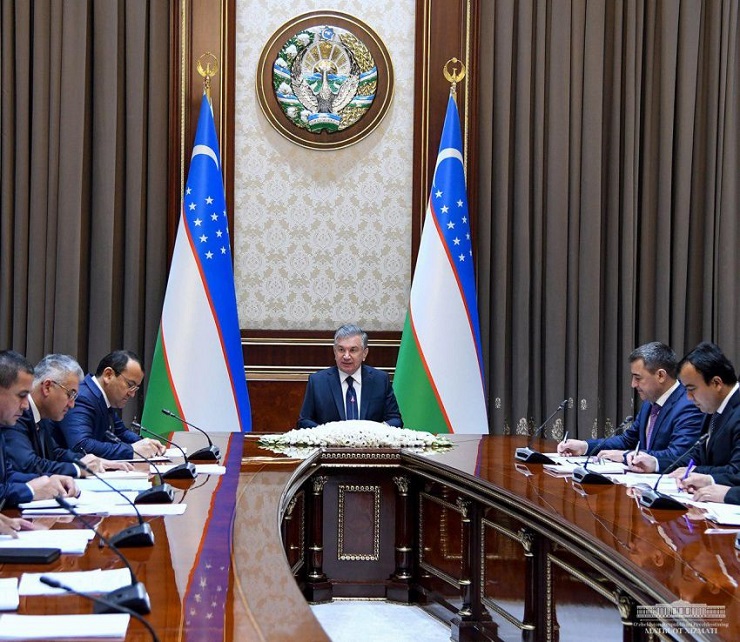


President of the Republic of Uzbekistan Shavkat Mirziyoyev has held a meeting to analyze current efforts for industrial development, production and uninterrupted delivery of oil and gas products to consumers.
The meeting started from responsible officials reporting on industrial production volumes and fulfillment of forecast indicators for 9 months of the current year. It was noted that over the mentioned period, industrial goods worth 234.7 trillion soums were produced; growth compared to the same span of time last year amounted to 7 percent, 6.5 percent of which was secured by the driver of the economy – industries that manufacture finished products.
In particular, high growth rates have been achieved in the automotive industry. The volume of production of cars compared to the same period in 2018 increased by 40 percent, trucks – by 33 percent, buses – 3.8 times, automobile engines – 45 percent.
The manufacture of knitted fabric grew by 26 percent, leather products – by 22 percent, cement – 18 percent, cable and wire products – 23 percent, consumer goods – almost 16 percent.
The best production indicators were recorded in Andijan, Namangan, Khorezm, Samarkand, Tashkent and Surkhandarya regions.
Owing to the constant attention paid by the head of state to the development of small business, the decrees and resolutions adopted in this area, the business environment in the country has drastically improved. This is backed by the fact that since the start of this year, a total of 72.4 thousand enterprises have been created, including about 16 thousand small businesses in industries. The number of small industrial enterprises grew by 25 percent compared to the same period in 2018.
The share of private enterprise in industry is becoming increasingly significant. For 9 months of this year, small businesses produced goods worth 81 trillion soums, which amounted to 34.5 percent of the total industrial output.

The advancement of manufacturing industry was followed by growth in exports, amounting to 24 percent. In particular, the exports of cars multiplied 3.3 times, buses – twofold, freight vehicles – 1.5 times, transformers and batteries – 2.7 times, cable and wire products – 2.2 times, shoes – 2.1 times. Exports of yarn grew by 19 percent, finished knitwear and garments – by 25 percent, knitted fabric – 31 percent, finished textile goods – 38 percent, food products – 14 percent, non-ferrous metals and items thereof – 45 percent, ferrous metal products – 54 percent.
The Ministry of Economy and Industry has been instructed to carry out continuous monitoring of industries, find swift solutions to problems, and create a system to stimulate the further growth of the industrial potential of regions. Particular emphasis was placed on the need to strengthen the participation of small and medium-sized businesses in industrial production.
The state of affairs in the oil and gas industry was also analyzed at the meeting. The importance was noted of measures taken in recent years as part of large-scale institutional reforms to raise efficiency and improve the system of managing the industry.
Discussion focused on the problems in the field, shortcomings in the implementation of designed projects. It was instructed to take measures by the end of the year to fill in the possible backlogs, as well as to formulate a forecast for 2020 for the production and distribution of oil, oil products, natural and liquefied gas.
In the meantime, special attention should be paid, it was stressed at the meeting, to increasing the production and processing of hydrocarbons, their uninterrupted delivery to the population and for exports, and reducing technological costs and losses.
The Ministry of Energy and oil and gas enterprises have been instructed to ensure the fulfillment of forecast indicators for the production of petroleum products, natural and liquefied gas, as well as their supply to economic sectors and the private consumers.
Officials have been placed personal responsibility for preparations for the autumn-winter season, for the targeted use of borrowed funds, for finding additional reserves to boost oil and gas exports, and introducing a monitoring and accounting system for production volumes per wells.
To coordinate the implementation of the tasks it was proposed to form a working group from among the senior officials of the Accounts Chamber, ministries of economy and industry, energy and other interested government agencies.
The President insisted that executives report on the works undertaken to prepare economy sectors and social facilities for the fall-winter season, paying particular attention to ensuring sustainable supply of fuel and energy resources to customers.
Appropriate measures were identified on the issues discussed at the meeting.